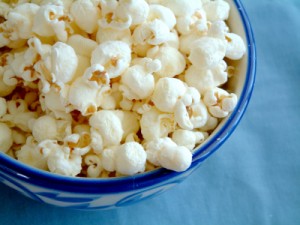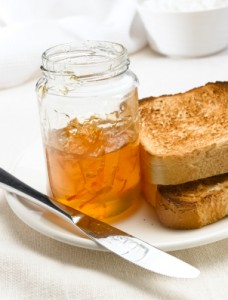 Everyone knows that acai berries, broccoli and watercress are full of the vitamins and minerals you need, but what about the foods you truly enjoy, the ones you’re not supposed to have? New studies show that the forbidden egg may actually be a superfood, considering that it’s chock-full of nutrients and antioxidants. I’m happy now to reveal other shocking superfoods hiding in our cabinets.
Everyone knows that acai berries, broccoli and watercress are full of the vitamins and minerals you need, but what about the foods you truly enjoy, the ones you’re not supposed to have? New studies show that the forbidden egg may actually be a superfood, considering that it’s chock-full of nutrients and antioxidants. I’m happy now to reveal other shocking superfoods hiding in our cabinets.
POPCORN
This basic movie snack could keep you from getting cancer and help you lose those few extra pounds. It’s a little known fact that popcorn as a wholegrain has the ability to reduce your cancer and heart disease risk. Downing a 30g serving (a half of a small popcorn box) is equal to eating a normal portion of whole wheat pasta or brown rice, said Catherine Collins, a chief dietician at London’s George’s Hospital.
In terms of weight, popcorn has three times the fiber of sunflower seeds, making you feel fuller much longer. Popcorn also helps balance your blood sugar levels. This makes you less likely to crave sweets and prevents mood swings. This helps you lower bad cholesterol, and it has plenty of vitamins for energy. A 2009 study shown to the American Chemical Society hinted that the health benefits of popcorn could be attributed to high polyphenol levels. Polyphenols are antioxidants that are believed to wipe out free radicals—chemicals that are have long been associated with severe health problems, such as heart disease and cancer.
Be careful, however, not to load up on extra sugar and salt.
PEANUT BUTTER
As a source of non-saturated fats, peanut butter has long been a great dietary choice, because it contains low levels of monounsaturated fats. It is also high in protein, which helps you stay full and helps regulate the digestive system. This aids in preventing heart disease and colon cancer, Collins said.
It is believed that nuts reduce inflammation inside the body and help blood vessels flowing to the heart remain healthy. Researchers at Harvard Medical School said recently that eating peanut butter five days per week can reduce your risk of a heart attack by 50 percent.
Even better than that is the fact that you don’t have to diet to reap the health benefits of peanut butter. Studies have shown those who snack on peanut butter tend to snack much less than others.
BAKED BEANS
The underestimated baked bean has many nutritional benefits, including iron, fiber, calcium and protein. This helps promote bone and muscle health. They also have a lot of low Glycemic Index (GI)-carbohydrates. Low GI-carbohydrates slowly break down energy, which makes you feel full longer than you would normally.
In addition to lowering your cholesterol and maintaining steady blood sugar levels, baked beans are filled with insoluble fiber. This fiber moves quickly into the colon and large intestine. It is here that bacteria break down the food, Collins said.
As a result, fatty acids are produced. Fatty acids line the colon and help prevent colon cancer from developing. Women who consume 80g of baked beans fulfill one-fifth of a woman’s daily fiber needs, a quarter of her iron needs, as well as one-tenth of the protein she needs daily.
The tomato sauce found in baked beans contains a lot of lycopene, an antioxidant needed to fight prostate cancer and ward off heart disease.
One serving of beans gives you the recommended five servings of fruits or vegetables you need each day. Three heaping tablespoons equal the amount of vegetables you need daily. However, canned baked beans can be rich in fat and sugar, so you should opt for those with less fat and sugar levels.
MARMALADE

Marmalade contains pectin, an ingredient that turns to gel and helps cure constipation. It can also soothe a sore throat, according to a study by the Institute of Food Research. Studies also indicate that it slows the development of tumors. Marmalade can also lower cholesterol.
Marmalade also contains natural sugars, which are healthier than the sugars found in traditional jam and jelly. There are 20 times more antioxidants in one gram of marmalade than there are in a glass of orange juice, making it healthier than a glass of orange juice. Though honey has been touted as one of the best natural sugars, marmalade is better in the sense that it is higher in antioxidants, according to Rebecca Foster at the British Nutrition Foundation.
Marmalade is also high in sugar, so eat small portions, and look for sugar-free versions.
RUSSET POTATOES
Containing more potassium than a banana, russet potatoes are believed to keep blood pressure low. They also have a lot of soluble fiber, which helps regulate heart and colon health. One russet potato contains only 135 calories and much of the fiber and protein your body requires each day.
If you eat the skin, you are getting half the amount of B6 and C vitamins experts say are needed to improve mood. They also contain beta carotene and folate, which fight cancer and fulfill your daily need for folate and iron, Collins said.
A U.S. study on antioxidants found that russet potatoes contain 13.2 capacities of antioxidants, making them better for you than tomatoes, kiwi and many other fruits and vegetables.
Keep in mind that frying these with butter will offset the health benefits you would otherwise gain!
PORK SCRATCHINGS
Most of us wouldn’t feel comfortable asking for pork scratching, but surprisingly, they are very healthy for you.
Two-thirds of the fat found in pork scratching is polyunsaturated and monounsaturated, which boosts heart health. Much of this fat comes from stearic acid and healthy saturated fat that keeps cholesterol levels steady, Collins said. Scratchings contain collagen from the skin; it is high in protein, which makes you feel full. This also keeps your muscles and bones healthy. The 2g of protein found in 20 grams of pork scratching is more than is present in eggs! This is one-fifth of your RDA.
Keep in mind that pork scratching can be high in salt, so monitor your intake accordingly.
NUTELLA
Nutella is high in lecithin, a soy extract that is rich in protein, iron and calcium, each of which promotes bone health, helps you feel full, and gives you more energy, according to dietician, Sonia Kakar.
Cocoa contains antioxidants that regulate blood pressure, has fewer calories than jam and releases energy slower than many other foods. It is also rich in calcium, which keeps bones healthy and strong. The cocoa found in Nutella contains antioxidants that decrease blood pressure and cut down on your risk of developing clots. The nuts found in Nutella also promote good health and boost the immune system with folic acid.
CHEDDAR CHEESE
Cheese can provide you with 25 percent of the calcium needed for a balanced diet, says the British Nutrition Foundation. It is also chock- full of the nutrients you need to strengthen bones and teeth. It contains zinc for skin health and also boosts fertility.
Eating a little cheddar after a meal helps neutralize mouth acids and produces saliva. However, cheddar should be eaten in small amounts because of its high fat content.
HORSERADISH SAUCE
Horseradish belongs to the same family as Brussels sprouts and broccoli. Horseradish sauce contains large amounts of compounds that improve liver function and boost heart health.
Other vegetables contain great nutrients, but horseradish has nutrients that are healthier than those found in broccoli, including lots of B vitamins.
It is also thought to promote a healthy immune system because of its high vitamin C content.
Some fruits and vegetables are better than others. For example, blueberries are great for you, but black currants are even better, according to experts. Sweet potatoes and spring greens are also great choices, as they contain the vitamins your body needs to function properly.
Curly kale and papaya are two other healthy food options. Curly kale reduces your risk of going blind. Both of these are packed with antioxidants.
If you liked this article you may be interested in this product from our sponsor.

 Off The Grid News Better Ideas For Off The Grid Living
Off The Grid News Better Ideas For Off The Grid Living



